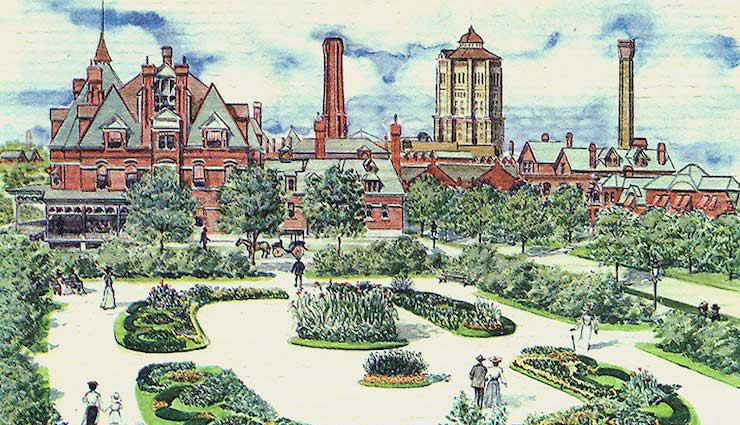A company town is a planned community in which practically all stores and housing are owned by the one company that also is a primary (or sometimes only) employer for its residents, common (for instance) in remote areas of the U.S. after the industrial revolution, particularly in industries such as coal mining and lumber production. Often designed as “morally uplifting” but isolated utopias for their workers, company towns are settings rife for speculative fiction—from an out-of-town P.I. caught in a conspiracy to a banker dodging terrorist plots, author Madeline Ashby shares five of her favorite fictional company towns…
Red Harvest
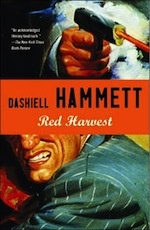 When I set about writing Company Town, one of the first novels I read in preparation was Dashiell Hammett’s Red Harvest. I liked it so much I even tried to include a quote from it in the novel: “This damned burg’s getting me. If I don’t get away soon I’ll be going blood-simple like the natives.” Red Harvest is short and brutal. It takes place in a company town called Personville, which the residents call “Poisonville.” Hammett uses his experience as a former Pinkerton detective to tell the story of the “Continental Op,” a private dick brought in by a newspaper reporter who naturally winds up dead. Hammett himself was on the side of organized labour: he joined the Communist Party, and he submitted to a prison sentence rather than give up the names of contributors to the Party. Both he and his partner, playwright Lillian Hellman, were blacklisted.
When I set about writing Company Town, one of the first novels I read in preparation was Dashiell Hammett’s Red Harvest. I liked it so much I even tried to include a quote from it in the novel: “This damned burg’s getting me. If I don’t get away soon I’ll be going blood-simple like the natives.” Red Harvest is short and brutal. It takes place in a company town called Personville, which the residents call “Poisonville.” Hammett uses his experience as a former Pinkerton detective to tell the story of the “Continental Op,” a private dick brought in by a newspaper reporter who naturally winds up dead. Hammett himself was on the side of organized labour: he joined the Communist Party, and he submitted to a prison sentence rather than give up the names of contributors to the Party. Both he and his partner, playwright Lillian Hellman, were blacklisted.
Dashiell Hammett is the mind behind both The Thin Man and The Maltese Falcon. His works were ideally suited to film thanks to his masterful control of point-of-view and perspective within the prose. Hammett works his words like a camera: we see what Sam Spade (or the Continental Op) sees, but that gaze never once peers within. The distance between what a Hammett anti-hero feels and what he actually tells you creates a sense of tension and dread within every story. It’s like jazz: it’s the notes you don’t hear. Also, Hammett has the best cure for a sleepless night in the world: a cold bath and a colder gin.
Eutopia
 I can’t mention novels set in company towns without mentioning my husband’s first novel, Eutopia: A Novel of Terrible Optimism. The book takes place in Eliada, a fictional logging and lumber milling town in Idaho in 1911, but really it’s about the early American eugenics movement. Young Jason Thistledown is the sole survivor of a plague that sweeps his small town of Cracked Wheel, and manages to winter alone until his mysterious aunt, Germaine Frost, arrives to take him to Eliada. In Eliada, they find an experimental community tied to the eugenics movement, and also a very pretty girl named Ruth, a family of hill folk, and possibly a god. I could go on and on about my husband’s skills as a prose stylist, and the quality of his ideas, but really what I like about this novel is watching reviewers and readers tear their hair out trying to figure out who the real monster is, at the end of this book.
I can’t mention novels set in company towns without mentioning my husband’s first novel, Eutopia: A Novel of Terrible Optimism. The book takes place in Eliada, a fictional logging and lumber milling town in Idaho in 1911, but really it’s about the early American eugenics movement. Young Jason Thistledown is the sole survivor of a plague that sweeps his small town of Cracked Wheel, and manages to winter alone until his mysterious aunt, Germaine Frost, arrives to take him to Eliada. In Eliada, they find an experimental community tied to the eugenics movement, and also a very pretty girl named Ruth, a family of hill folk, and possibly a god. I could go on and on about my husband’s skills as a prose stylist, and the quality of his ideas, but really what I like about this novel is watching reviewers and readers tear their hair out trying to figure out who the real monster is, at the end of this book.
Down and Out in the Magic Kingdom
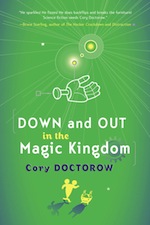 Company towns also come in many shapes and sizes, which is why I count Down and Out In the Magic Kingdom by Cory Doctorow as one of them. The novel mainly takes place in Walt Disney World, and it explores the intentionality and single-minded focus of the community Walt himself once imagined for EPCOT. (Did you know that EPCOT was supposed to be a city, and not a theme park? Now you do.) The novel moves like gangbusters. You can polish it off in an afternoon. It has a spiritual sequel in Makers, which I think is in quiet running to be a Great American Novel. (It just happens to have been written by a Canadian who was living in England at the time.) But if what you want is a novel that takes place in one place, and is about that place and what that place means and what it does to people, pick up Down and Out.
Company towns also come in many shapes and sizes, which is why I count Down and Out In the Magic Kingdom by Cory Doctorow as one of them. The novel mainly takes place in Walt Disney World, and it explores the intentionality and single-minded focus of the community Walt himself once imagined for EPCOT. (Did you know that EPCOT was supposed to be a city, and not a theme park? Now you do.) The novel moves like gangbusters. You can polish it off in an afternoon. It has a spiritual sequel in Makers, which I think is in quiet running to be a Great American Novel. (It just happens to have been written by a Canadian who was living in England at the time.) But if what you want is a novel that takes place in one place, and is about that place and what that place means and what it does to people, pick up Down and Out.
Stardust
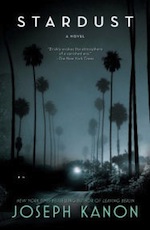 Similarly, I think you can also read Stardust by Joseph Kanon as a company town novel. It takes place in Hollywood after the Second World War. The main character is a war reporter looking to find a producer and director who will edit his footage of concentration camps being liberated into a film for mainstream audiences. (This was partially inspired by Hitchcock’s lost Holocaust documentary.) Then his brother dies, and he has to solve the murder. The book has everything: murder, fifth columnists, secrets, sex, lies. What makes it a company town novel is the insular quality of Hollywood at the time—it takes place only thirty years after Hollywood merged into L.A., and before L.A. had swallowed over eighty separate districts into in what is now the Greater Los Angeles Area.
Similarly, I think you can also read Stardust by Joseph Kanon as a company town novel. It takes place in Hollywood after the Second World War. The main character is a war reporter looking to find a producer and director who will edit his footage of concentration camps being liberated into a film for mainstream audiences. (This was partially inspired by Hitchcock’s lost Holocaust documentary.) Then his brother dies, and he has to solve the murder. The book has everything: murder, fifth columnists, secrets, sex, lies. What makes it a company town novel is the insular quality of Hollywood at the time—it takes place only thirty years after Hollywood merged into L.A., and before L.A. had swallowed over eighty separate districts into in what is now the Greater Los Angeles Area.
Half the Night is Day
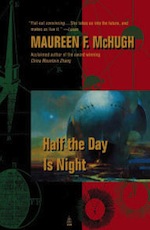 Finally, I can’t finish this post without mentioning one of the novels that inspired Company Town: Maureen McHugh’s Half the Day Is Night. The novel takes place in an underwater city called Julia, which is part of a larger nation of Caribe. In it, a bodyguard named David watches over a banker named Mayla. Frequent attacks on Mayla cause them both to leave the city, which in turn causes a re-consideration of the city’s value and its community. What I like about McHugh’s work is that it’s actually about working people. (I also like this about Doctorow’s books.) If there’s one thing that all these novels have in common, it’s that they’re about people with jobs, people who have to get up and do stuff they don’t want to do, and the dignity of that.
Finally, I can’t finish this post without mentioning one of the novels that inspired Company Town: Maureen McHugh’s Half the Day Is Night. The novel takes place in an underwater city called Julia, which is part of a larger nation of Caribe. In it, a bodyguard named David watches over a banker named Mayla. Frequent attacks on Mayla cause them both to leave the city, which in turn causes a re-consideration of the city’s value and its community. What I like about McHugh’s work is that it’s actually about working people. (I also like this about Doctorow’s books.) If there’s one thing that all these novels have in common, it’s that they’re about people with jobs, people who have to get up and do stuff they don’t want to do, and the dignity of that.
Top image depicts Pullman, Illinois, a town of railway workers who famously went on strike in 1894.
 Madeline Ashby is a science fiction writer, strategic foresight consultant, anime fan, and expat. Her debut serious about killer robots included vN and the sequel, iD. Her essays and criticism have appeared at BoingBoing, io9, Worldchanging, Creators Project, Arcfinity, and Tor.com. Since late 2014, she has been a regular columnist for the Ottawa Citizen. Company Town is out now from Tor Books.
Madeline Ashby is a science fiction writer, strategic foresight consultant, anime fan, and expat. Her debut serious about killer robots included vN and the sequel, iD. Her essays and criticism have appeared at BoingBoing, io9, Worldchanging, Creators Project, Arcfinity, and Tor.com. Since late 2014, she has been a regular columnist for the Ottawa Citizen. Company Town is out now from Tor Books.










